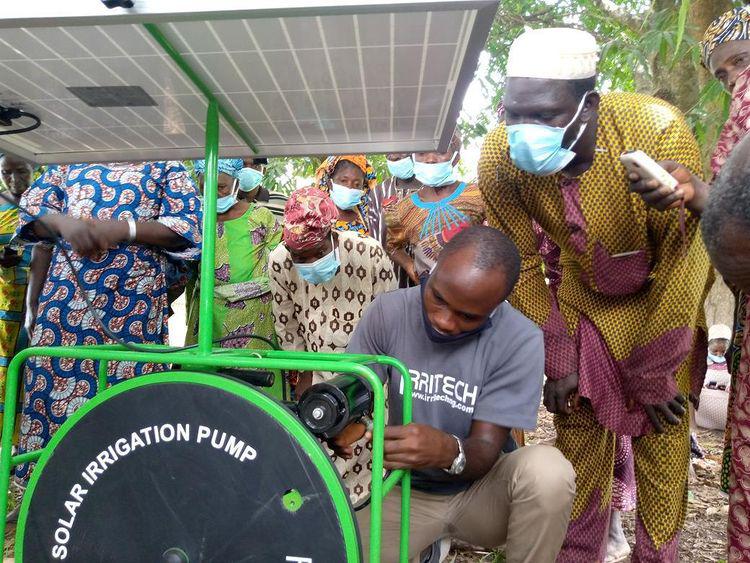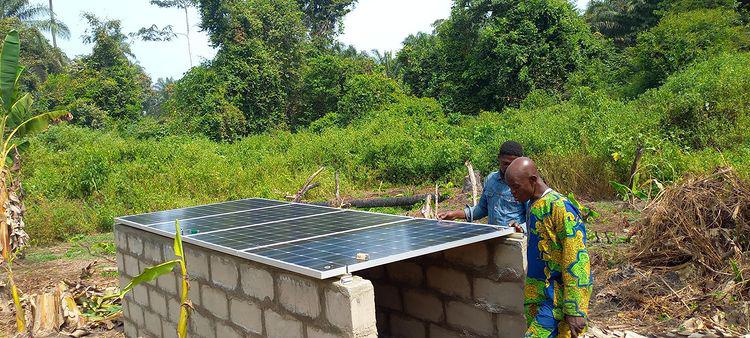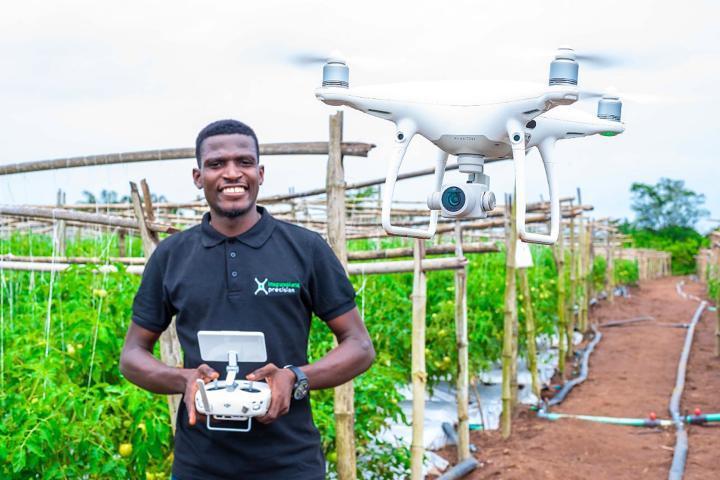Inside Irritech's effort to enable irrigation in Nigeria
Founded in 2020, Irritech has provided solar-powered irrigation and water pumping systems for 2146 farmers across 16 states in Nigeria

Kenneth Okonkwo, a young Nigerian CEO of Irritech Nigeria limited, is making a difference; he is shaping Nigeria's agriculture through life-changing technologies for smallholder farmers. He provides affordable and highly efficient solar-powered Irrigation kits and micro-irrigation systems.
Mr Okonkwo’s journey started at school, where he studied agriculture. During his NYSC, he started his farm. He also worked with smallholder farmers; while doing this, he discovered that most farmers lacked access to constant water to keep up with production. He observed that most of these farmers become poorer during the dry season due to low production, yet they still do not make much profit during the rainy season. They only resort to farming during the rainy season because that is the standard practice.
Inspired by this, he started to innovate something to alleviate the challenges of the farmers such that they have constant access to water all year round without depending on rainfall or electricity. He spoke with friends who were vast in renewable energy and water and irrigation management since he was just an "agric guy"; they came together and designed a plan. They started looking for partners to fund the idea, and luckily for them, they got into a program called 'orange corners'. It was an incubation program by the Netherland government; Irritech was provided with its first funding, mentorship and training to start the business.
In this interview, Kenneth Okonkwo shared how his journey began in the Agritech space and how he developed Irritech.
Why is irrigation necessary?
The need for irrigation has increased as climate change has affected rainfall patterns; plants can no longer depend on rain-fed agriculture alone as it is not sustainable due to the growing demand for food.
Irrigation is the agricultural process of applying a controlled amount of water to land to assist in the production of crops. Irrigation has been a central feature of agriculture for over 5000 years. It has evolved to meet the population's demand as farms have become more prominent, and farmers need efficient and more accessible usage methods. Still, many smallholder farmers depend on rain-fed agriculture. According to FAO, only 1% of 30 million hectares of farmland is irrigated in Africa despite irrigation history. This figure has to improve to meet the changing climatic condition of the African continent.
What is your reach so far?
Irritech started in 2020. It provided solar-powered irrigation and water pumping systems for farmers in Nigeria. So far, it has reached 2146 farmers across 16 states 70% of their installation is in the South Western part of the country. Being in the growth process, they have gotten funding from foreign and local organisations so that smallholder farmers can access this technology.
Even though Irritech has been made more affordable when compared to the conventional systems, farmers still can't purchase these products out rightly. It has led Mr Okonkwo and his team to source for international financial organisations that can provide funds for the farmers to have access to using Irritech products.
Partners like GIZ Germany have funded 1200 farmers across Ogun and Oyo states. World Bank and the Lagos State Government have also provided funds for farmers in Lagos state. The international fertiliser development centre (IFDC) has provided funds for farmers in 6 states across the country (Kaduna, Kano, Plateau, Ondo, Ekiti and Ogun). They are presently securing a partnership with Kickstarter based in the USA to serve 500 farmers in the Niger Delta States of Nigeria.

Why solar-powered irrigation systems and not the conventional type?
Conventional irrigation systems are time-wasting and energy-consuming, and these prevent farmers from other economic activities that will make them money for their families.
Most of these communities do not have electricity, and even when they do, the electricity tariff is too high. Using petrol or diesel-powered pumps is also very expensive; they contribute to environmental pollution contributing to climate change. According to McKinsey & Company, the Agricultural sector accounts for a large, growing and impactful share of global greenhouse gas emissions. The agricultural industry tries to solve this problem that has resulted in climate change by innovating. Irritech's system of powering its irrigation through solar provides a solution that is an eco-friendly environment.
Solar-powered irrigation is more affordable and sustainable for use. By just pushing a button, farmers can control the system. They have also developed a solution where farmers can control and monitor the system with a smartphone. They can now produce all year round with increased yield, reduced operational cost and an overall increase in income.

What are the challenges you encountered?
He shares the challenges he faces in terms of funding and mobility. Most of the products used are from outside the country. Manufacturing within the country is expensive, and getting the materials from the port is a massive problem as clearing the products is not easy.
Logistics and transportation are also a big challenge. Even though they have tried to address this issue by having a logistics department, it has not been fully solved. Sourcing the materials locally is also very tough, and it is expensive too. Most of the farmers can't afford irrigation.
What is your advice for people who want to adopt agricultural technology?
He advises young people with a passion for developing technology in agriculture to look for ways to innovate in the area of food production in Africa. There are so many solutions yielding ideas out there, but ensure it can work with the local farmers and it is a technology that suits our clime. People can make informed decisions by engaging farmers. Irritech's first trial was unsuccessful because they tried a prototype of another region entirely different from ours. They started to look within when they learnt their lessons, and today farmers benefit. Therefore, more people should look into impactful and relevant technological solutions.
One doesn't have to be an expert to see how technology has changed the concept of farming, making it more profitable, efficient, safer and simple. Therefore, more innovations that fit the African farmer's economy, like Irritech Nigeria Limited, should be adopted to ensure the continent's food security.
This is a guest post by Mary Apeh, an agricultural communications specialist.








Comments ()